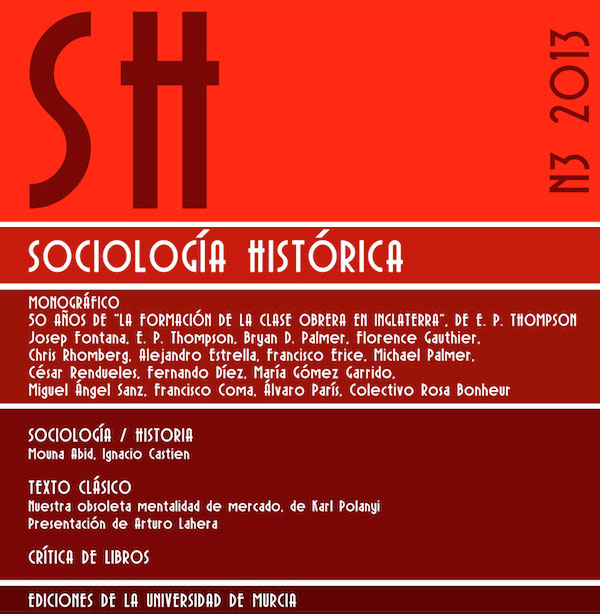La revolución democrática en E.P. Thompson: una forma radical de escribir historia
Resumen
Este artículo se ocupa de uno de los principales temas desarrollados por Thompson en La formación de la clase obrera en Inglaterra, frecuentemente ignorado por la historiografía: el del fallido proyecto de revolución democrática en Inglaterra a finales del siglo XVIII y principios del siglo XIX. El evocar nuevamente los proyectos populares que fueron aniquilados por el liberalismo, supone no sólo revalorizar esas luchas dentro de su propio contexto histórico. Constituye también un intento por poner en cuestión las teorías liberales de la modernización que minimizan el papel del conflicto social y de la clase trabajadora en la historia. Por otra parte, para entender el contenido de la obra de Thompson desde esta perspectiva, y siguiendo en buena medida a Walter Benjamin y a la teoría literaria marxista y postestructuralista, creemos imprescindible atender también a la forma en la que Thompson concebía la historia, así como a alguna de las exclusiones y contradicciones más evidentes que conformaron la producción y recepción de su obra.Descargas
-
Resumen449
-
PDF273
Las obras que se publican en esta revista están sujetas a los siguientes términos:
1. El Servicio de Publicaciones de la Universidad de Murcia (la editorial) conserva los derechos patrimoniales (copyright) de las obras publicadas, y favorece y permite la reutilización de las mismas bajo la licencia de uso indicada en el punto 2.
2. Las obras se publican en la edición electrónica de la revista bajo una licencia Creative Commons Reconocimiento-NoComercial-SinObraDerivada 4.0 España (texto legal). Se pueden copiar, usar, difundir, transmitir y exponer públicamente, siempre que: i) se cite la autoría y la fuente original de su publicación (revista, editorial y URL de la obra); ii) no se usen para fines comerciales; iii) se mencione la existencia y especificaciones de esta licencia de uso.
3. Condiciones de auto-archivo. Se permite y se anima a los autores a difundir electrónicamente las versiones pre-print (versión antes de ser evaluada) y/o post-print (versión evaluada y aceptada para su publicación) de sus obras antes de su publicación, ya que favorece su circulación y difusión más temprana y con ello un posible aumento en su citación y alcance entre la comunidad académica. Color RoMEO: verde.










